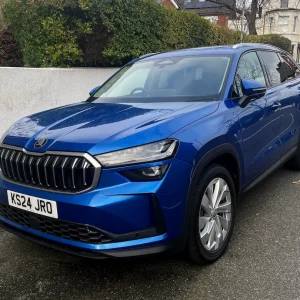In case you couldn’t tell, the Swace which was launched back in 2020, is closely based on the Toyota Corolla – a car we also admire, as it received a ‘Highly Commended’ Best Family Car award at the 2023 Business Car Awards.
Last year, the Corolla received mid-life upgrades, and as a result, the Swace benefitted too – but should you choose the Toyota or this upgraded Swace if you’re in the market for a family estate?
Outside, it’s hard to spot this updated version of the Swace – let alone whether it’s the Suzuki or Toyota version. This is because, apart from the new LED rear lights and chrome detailing on the lower part of the rear bumper – it is unchanged from the pre-facelift car. This chrome detailing is odd, as it doesn’t carry on to the front bumper!
Like the Toyota, the biggest changes have happened underneath the Suzuki, where the 1.8-litre hybrid powertrain (the 2.0-litre hybrid remains exclusively available in the Corolla), gets more power – up from 122hp to 140hp. The good news for Swace and Corolla fans, is that despite the increase in power, there are only minimal changes to the fuel economy and CO2 emissions.
As a result of the power boost, the Swace’s 0-62mph acceleration time drops by nearly two seconds, to 9.4 seconds. Although, on the move it’s hard to spot this extra power – in fact, if you try to match these claimed acceleration figures, you’ll hear the Swace’s engine working hard, and this isn’t pleasant for your ears.
Elsewhere, keep within its limits, and the Swace is a tidy drive. The steering is surprisingly precise, and while there is some roll, this Suzuki handles competently. Plus, unless you’re working the Swace hard (and it doesn’t encourage you to do that), it’s impressively refined mostly thanks to the 16in alloy wheels.
Inside, like the outside, Suzuki badging aside, the feel is very much Corolla. Although, the 7in driver cluster is small compared to the 12.5in screen in the Toyota. The Toyota also gets a 10.5in infotainment screen, compared to the Swace’s smaller 8in unit. The graphics and resolution are fine but nothing more. Good thing then, that the navigation is taken care of by apps such as Google Maps and Waze, via Apple Carplay and Android Auto connection. At least, the infotainment is easy to use – but the Corolla has the more modern system.
The Corolla is popular with the minicab industry, and when you get in this Suzuki, it’s easy to see why, as it’s spacious and comfortable in the front and rear – there’s also an impressively practical 596-litre boot, with neat underfloor stowage solutions. In Ultra range-topping specification, which we have here, it is well-equipped, with heated front seats and steering wheel, plus a rear parking camera.
Then, there’s the driver assistance systems, of which there are many. We found the most useful were the lane trace assist, dynamic radar cruise control, and an emergency stop system when driving, which can halt the car safely if the driver is unresponsive.
Elsewhere, the plastics are good quality and items such as the leather-trimmed steering wheel are welcome.
So, we know the Toyota has the better infotainment system, but apart from this, is the Suzuki a better buying option? For starters, the Swace is more than £400 cheaper, more importantly it sits one BiK band lower than the Toyota, thanks to its lower emissions, a result of its smaller standard alloy wheels.
If you can live with the slightly inferior infotainment, other than the Suzuki’s slightly lower running costs, there is little to separate them and we’d happily make the sacrifice, and we’re sure many others would be happy to do the same.
Suzuki Swace 1.8 Full Hybrid Ultra
P11D: £31,169
Residual value: 40%
Depreciation: £18,570
Fuel: £6,389
Service, maintenance and repair: £2,315
Cost per mile: 45.45p
Fuel consumption: 64.2mpg
CO2 (BIK %): 103g/km (25%)
BIK 20/40% a month: £129/£259
Luggage capacity: 596 litres
Engine size/power: 1,798cc/140hp





